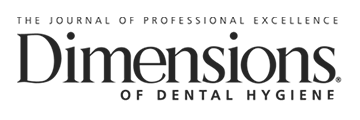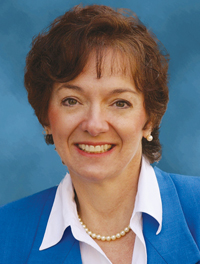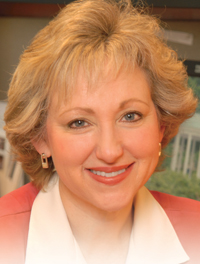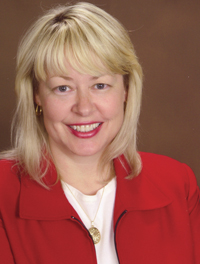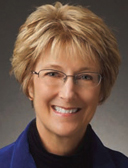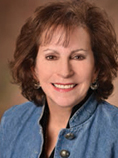 Terri Tilliss, RDH, PhD, is a professor in the Department of Graduate Orthodontics at the University of Colorado School of Dental Medicine in Denver. She facilitates resident research projects, teaches communication and behavior change skills to international dental students and orthodontic and periodontal residents, and provides dental hygiene care within the faculty group practice. Tilliss teaches in the university’s interdisciplinary health professional education curriculum, where she impacts future medical, dental, nursing, physical therapy, and pharmacy students. She also coaches medical students within the health communications curriculum. Health-related behavior change and health care communication are two of her research and teaching interests. She continues to publish extensively in the dental and dental hygiene literature and provides educational programs nationally and internationally.
Terri Tilliss, RDH, PhD, is a professor in the Department of Graduate Orthodontics at the University of Colorado School of Dental Medicine in Denver. She facilitates resident research projects, teaches communication and behavior change skills to international dental students and orthodontic and periodontal residents, and provides dental hygiene care within the faculty group practice. Tilliss teaches in the university’s interdisciplinary health professional education curriculum, where she impacts future medical, dental, nursing, physical therapy, and pharmacy students. She also coaches medical students within the health communications curriculum. Health-related behavior change and health care communication are two of her research and teaching interests. She continues to publish extensively in the dental and dental hygiene literature and provides educational programs nationally and internationally.
Tilliss has twice been guest editor of The Annual Report on Dental Hygiene, a special supplement to the Journal of Evidence-Based Dental Practice published in June 2014 and June 2016.
A past officer of the Oral/Dental Hygiene section of the International Association of Dental Research, Tilliss received the Annual Researcher of the Year Award in 1999. She was also honored with the American Dental Hygienists’ Association Award for Excellence in Dental Hygiene in 2000. Tilliss is a member of Dimensions of Dental Hygiene’s Editorial Advisory Board.
What drew you to a career in academia, and how did you get started?
In academia, not once have I felt I didn’t want to go to work— pretty remarkable after 35 years. My motivation to work in academia was inspired by two pivotal factors. The first is that I, to some degree, idolized my dental hygiene faculty from the baccalaureate program at the University of Iowa. They were capable, caring, and they looked like they were having a grand time. I distinctly remember saying to myself, “I want to do what they do.” I was at a university with one of the few master’s degree programs in dental hygiene at the time. Upon the advice of my faculty, I worked as a clinical dental hygienist before starting graduate school. Excellent advice, both to hone my skills and to get a necessary dose of the reality of dentistry if I was to become an educator. The second factor that drew me to academia was that, once in practice, I missed school. No longer was I required to read research articles and write papers, but I still wanted to do these things.
I have cherished working in academia because no two hours, days, semesters, or years are the same. I love the constant variety and the opportunity to influence enthusiastic young minds. Additionally, I view a classroom presentation as performance art. It is a treat each time I get to “perform.” I hope that at some moment in time I have inspired a student in the same way that I was inspired during my undergraduate education.
In what setting did you meet your first mentor?
As a student at the University of Iowa Department of Dental Hygiene—the chair of the department and the undergraduate and graduate faculty were all valuable mentors—each in their own unique and separate way.
What role did or has this mentor played in your professional life?
I have stayed in touch with one of my collegiate professors/mentors, Dorothy Rowe, MS, PhD—who has most recently been teaching within the Master’s Degree program at University of California, San Francisco.
I believe I learned two important lessons from her that still guide me today. First, no matter what circumstances life hands you, persevere—make the most of what you have and move o. Second, it is the ‘science’ that matters most!
What is your advice to young graduates interested in a career in academia?
My advice is to pursue advanced degrees—master’s degree AND BEYOND. You will be amazed at how you can combine ‘learnings’ from disparate fields and meld them into one. Second, network, network, network! You never know how you may be able to ‘call upon’ previous contacts in ways that you never imagined. Finally, find a niche area that interests you and that compliments dental hygiene that sets you apart. For me, it was ‘behavior change and communication skills’, which was fostered by my PhD in Health and Behavioral Sciences. When I was deliberating about beginning my PhD, I was told that it would open doors, and it really has. I am involved in academic pursuits now that wouldn’t have happened if I hadn’t made the decision to attain my doctorate.
You said no two hours are alike in the academic setting. Can you give us a breakdown of your typical day or week?
My days truly aren’t typical and vary daily. I am involved in collaborative writing projects and editing for a couple of online resource centers. I have guest-edited two special issues of the Journal of Evidence-Based Dental Practice (called the Annual Report on Dental Hygiene), which involved soliciting and editing articles from many different individuals. I may work with orthodontic residents on their research projects and serve on each resident’s research committee. I prepare and submit all Orthodontic Department clinical research projects to the University’s Human Subjects Committee (IRB), and provide CE courses on behavior change. I also teach behavior change and patient communication skills to dental undergrads and residents and to medical students; teach in the interprofessional development curriculum on campus; do some commercial scientific writing; and provide dental hygiene services to orthodontic patients. A ‘typical’ day could include any combination of these activities. I enjoy that I can work independently and manage my time with these tasks in a way that works for me. Now you can see why I love the variety in my day.
What motto do you live by?
“Be interested in and learn about as many DIFFERENT things as you can!” I like to feel that I know a little something about many different arenas, both personally and professionally.
